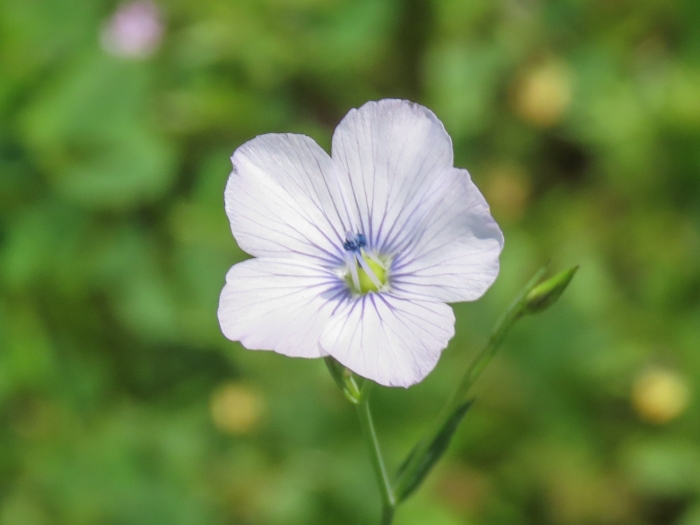Pale Flax
(Linum bienne)
Pale Flax (Linum bienne)
/
/

Emanuele Santarelli
CC BY-SA 4.0
Image By:
Emanuele Santarelli
Recorded By:
Copyright:
CC BY-SA 4.0
Copyright Notice:
Photo by: Emanuele Santarelli | License Type: CC BY-SA 4.0 | License URL: http://creativecommons.org/licenses/by-sa/4.0/ | Rights Holder: Emanuele Santarelli | Publisher: iNaturalist | Date Created: 2023-05-21T12:52:54-07:00 |
























Estimated Native Range
Summary
Linum bienne, commonly known as pale flax or narrowleaf flax, is a biennial or short-lived perennial herb native to the Mediterranean region and western Europe, extending north to England and Ireland. It thrives in dry, sunny calcareous or neutral grasslands, including coastal areas, open fields, and rocky slopes, from sea level up to 3281 feet (1000 meters). The plant typically reaches 24 inches (60 cm) in height, featuring long, narrow stems and slender leaves that are 1-2 inches (2.5-5 cm) long. Pale flax is notable for its delicate pale blue flowers, streaked with darker veins, each about 0.5 inches (1.3 cm) in diameter, which bloom from late spring through summer, adding a subtle charm to wildflower meadows and informal garden settings.
Pale flax is valued for its drought tolerance and ability to thrive in poor, well-drained soils, making it suitable for xeriscaping and naturalistic plantings. It is also appreciated for its airy, open habit and the gentle movement it adds to the garden when swayed by the breeze. In cultivation, it prefers full sun and can tolerate a range of soil types, provided they are well-drained. While not commonly used in large-scale horticultural applications, it can be an attractive addition to rock gardens, borders, and as part of a mixed meadow planting. It is also of historical interest as the probable wild ancestor of cultivated flax (Linum usitatissimum), which is grown for its fibers and seeds. Potential problems include susceptibility to rust and other fungal diseases, especially in humid conditions. It is generally not aggressive but can self-seed in favorable conditions.CC BY-SA 4.0
Pale flax is valued for its drought tolerance and ability to thrive in poor, well-drained soils, making it suitable for xeriscaping and naturalistic plantings. It is also appreciated for its airy, open habit and the gentle movement it adds to the garden when swayed by the breeze. In cultivation, it prefers full sun and can tolerate a range of soil types, provided they are well-drained. While not commonly used in large-scale horticultural applications, it can be an attractive addition to rock gardens, borders, and as part of a mixed meadow planting. It is also of historical interest as the probable wild ancestor of cultivated flax (Linum usitatissimum), which is grown for its fibers and seeds. Potential problems include susceptibility to rust and other fungal diseases, especially in humid conditions. It is generally not aggressive but can self-seed in favorable conditions.CC BY-SA 4.0
Plant Description
- Plant Type: Herb
- Height: 1.5-2.5 feet
- Width: 0.5-1 feet
- Growth Rate: Moderate
- Flower Color: Blue
- Flowering Season: Summer
- Leaf Retention: Semi-deciduous
Growth Requirements
- Sun: Full Sun
- Water: Low
- Drainage: Medium, Fast
Common Uses
Bee Garden, Border Plant, Butterfly Garden, Drought Tolerant, Low Maintenance
Natural Habitat
Dry, sunny calcareous or neutral grasslands, including coastal areas, open fields, and rocky slopes
Other Names
Common Names: Linseed, Schmalblättriger Lein, Narrow-leaved Flax
Scientific Names: , Linum bienne, Adenolinum angustifolium, Cathartolinum agreste, Linum acuminatum, Linum affine, Linum affine, Linum agreste, Linum agrestre, Linum ambiguum
GBIF Accepted Name: